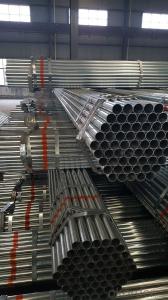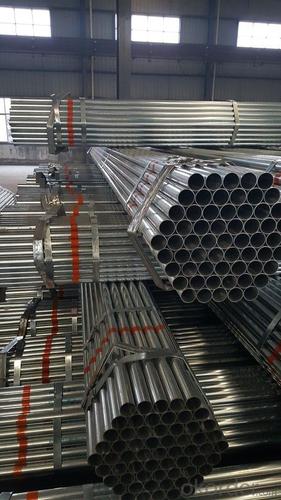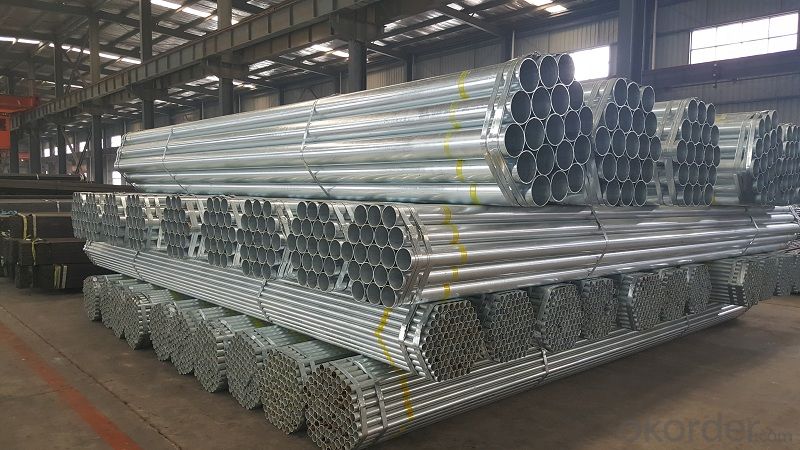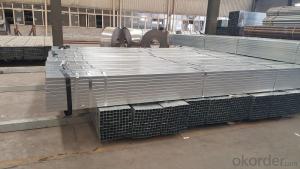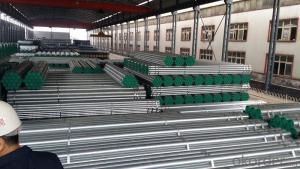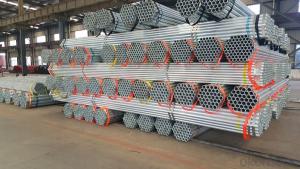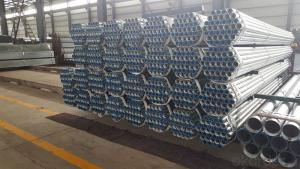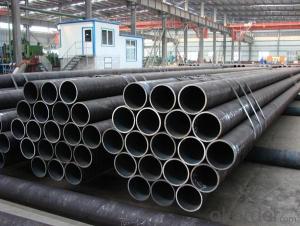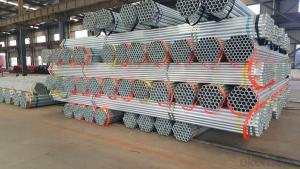Galvanized welded steel pipe for metallurgical machinery
- Loading Port:
- Shanghai
- Payment Terms:
- TT OR LC
- Min Order Qty:
- 15 m.t.
- Supply Capability:
- 12000 m.t./month
OKorder Service Pledge
OKorder Financial Service
You Might Also Like
Specification
1、Structure of Galvanized welded steel pipe for metallurgical machinery :
The surface of galvanized steel pipe welded steel pipe of hot dip galvanized layer or. Galvanized can increase the corrosion resistance of the steel tube, prolong service life. Galvanized pipe is widely used, in addition to water, gas, oil and other general low pressure fluid pipelines. It is also used in the petroleum industry, especially for offshore oil field of oil well pipe and oil pipe, chemical, coking equipment of oil heater, condensation cooler, coal run oil exchanger tube, and trestle pile, the mine tunnel support frame tube.
2、Main Features of Galvanized welded steel pipe for metallurgical machinery :
• High manufacturing accuracy
• High strength
• Good visual effect
• Reasonable price
3、 Galvanized welded steel pipe for metallurgical machinery Specification:
Standard | GB, DIN, ASTM ASTM A106-2006, ASTM A53-2007 |
Grade | 10#-45#, 16Mn 10#, 20#, 45#, 16Mn |
Thickness | 1 - 33 mm |
Section Shape | Round |
Outer Diameter | 21 - 610mm |
Place of Origin | Tianjin, China (Mainland) |
Secondary Or Not | Non-secondary |
Application | Hydraulic Pipe |
Technique | Cold Drawn |
Certification | API |
Surface Treatment | factory state or painted black |
Special Pipe | API Pipe |
Alloy Or Not | Non-alloy |
Length | 5-12M |
Outer Diameter | 21.3-610mm |
Grade | 20#, 45#, Q345, API J55, API K55, API L80, API N80, API P110, A53B |
Standard | ASME, ASTM |
1) Material:Q195 Q235 Q345 X42 X52
2) Specification range:OD:21.3-610mm,WT:6-70mm,length:6-12m or according to the requirement of clients.
3) Excutive standards:GB,ASME API5L.ASTM A 106/A53,Despite of the above standards,we can also supply seamless steel pipe with standard of DIN,JIS,and so on,and also develop new products according to the requirements of our clients!
4) Surface: galvanized.
5) Ends:Beveled or square cut,plastic capped,painted.
6) Packing:bundles wrapped with strong steel strip,seaworthy packing.
4、Packaging & Delivery
Packaging Details: | seaworthy package,bundles wrapped with strong steel strip |
Delivery Detail: | 15-30days after received 30%TT |
5、FAQ of Galvanized welded steel pipe for metallurgical machinery :
①How is the quality of your products?
Our products are manufactured strictly according to national and internaional standard, and we take a test
on every pipe before delivered out. If you want see our quality certifications and all kinds of testing report, please just ask us for it.
Guaranteed: If products’ quality don’t accord to discription as we give or the promise before you place order, we promise 100% refund.
②How about price?
Yes, we are factory and be able to give you lowest price below market one, and we have a policy that “ for saving time and absolutely honest business attitude, we quote as lowest as possible for any customer, and discount can be given according to quantity”,if you like bargain and factory price is not low enough as you think, just don’t waste your time.Please trust the quotation we would give you, it is professional one.
③Why should you chose us?
Chose happens because of quality, then price, We can give you both.Additionally, we can also offer professional products inquiry, products knowledge train(for agents), smooth goods delivery, exellent customer solution proposals.Our service formula: good quality+good price+good service=customer’s trust
SGS test is available, customer inspection before shipping is welcome, third party inspection is no problem.
6、 Galvanized welded steel pipe for metallurgical machinery Images:
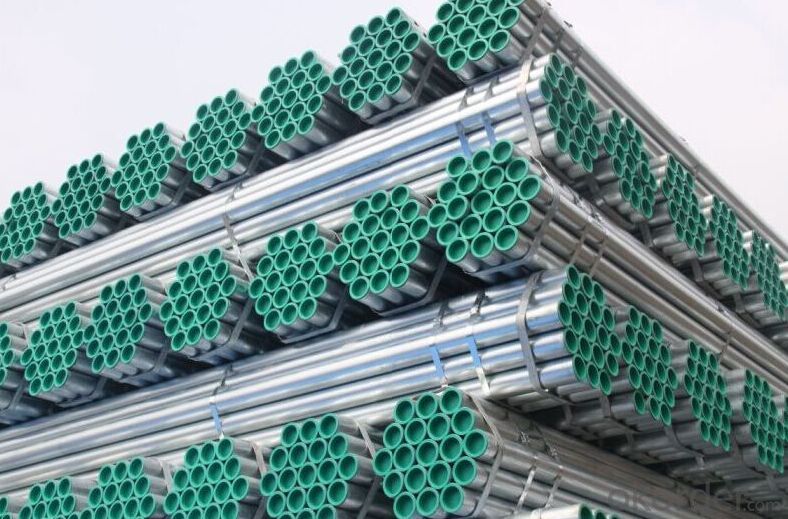
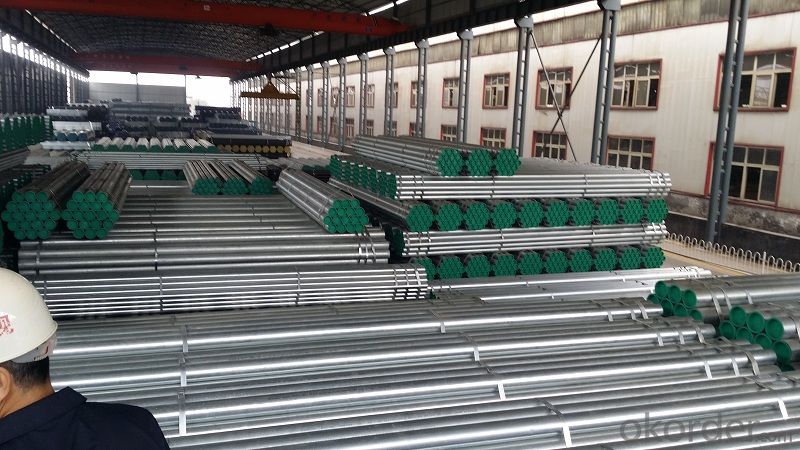
- Q: Does the seamless steel pipe need rust removal?
- Spray (throw) shoot derusting by the high-power motor to drive the spray shot (impeller) blade rotating speed, the steel grit, steel shot, iron wire, minerals and other abrasive jet for 20# seamless steel tube surface under the action of centrifugal force (left) radiation treatment, not only can completely remove the dirt and rust, oxide, and the role of 20# seamless steel in abrasive blast and friction force, can achieve the required uniform roughness.Not only can the physical adsorption effect on the surface of the pipe be increased, but also the mechanical adhesion of the anticorrosive layer to the pipe surface can be enhanced. Therefore, spraying (throwing) shot derusting is an ideal method of rust prevention for pipeline corrosion protection. Generally speaking, shot peening (sand) derusting is mainly used in the inner surface treatment of tubes, shot blasting (sand) derusting is mainly used for the outer surface treatment of tubes.
- Q: How are steel pipes used in the construction of telecommunications towers?
- Steel pipes are commonly used in the construction of telecommunications towers as they provide the necessary structural support and stability. These pipes are used for the tower's main framework, ensuring its durability and ability to withstand various environmental conditions. Additionally, steel pipes are also used for cable management, allowing for the safe and efficient installation of telecommunications equipment and cables.
- Q: What is the maximum temperature that steel pipes can withstand?
- The maximum temperature that steel pipes can withstand depends on the grade and type of steel used. However, generally, carbon steel pipes can withstand temperatures up to 816°C (1,500°F), while stainless steel pipes can withstand higher temperatures up to 1,200°C (2,192°F) or even more, depending on the alloy.
- Q: How are steel pipes used in the construction of underground parking structures?
- Steel pipes are commonly used in the construction of underground parking structures for various purposes such as drainage systems, ventilation, plumbing, and structural support. The pipes are utilized to facilitate the efficient flow of water and sewage, provide ventilation to ensure air circulation and remove harmful gases, supply water to different areas of the structure, and offer stability and strength to the overall construction.
- Q: How are steel pipes used in natural gas processing plants?
- Steel pipes are used extensively in natural gas processing plants for various purposes, including the transportation of natural gas, the transfer of various fluids, and the construction of pipelines and infrastructure. These pipes are highly durable, resistant to corrosion, and can withstand high pressure, making them ideal for safely transporting natural gas and other substances throughout the facility.
- Q: What is the difference between hot-dip galvanizing and electroplating for steel pipes?
- Hot-dip galvanizing and electroplating are two common methods used to provide corrosion protection for steel pipes, but there are key differences between the two processes. Hot-dip galvanizing involves immersing the steel pipes into a bath of molten zinc, which forms a metallurgical bond with the steel. This results in a thick and durable zinc coating that provides excellent corrosion resistance. The process of hot-dip galvanizing creates a uniform coating that covers the entire surface of the steel pipe, including both the external and internal surfaces. This makes hot-dip galvanizing particularly effective for protecting both the inside and outside of the pipes. On the other hand, electroplating is a process that involves the deposition of a thin layer of metal onto the surface of the steel pipes using an electric current. In the case of electroplating for steel pipes, typically a layer of zinc is applied. Unlike hot-dip galvanizing, electroplating does not provide a metallurgical bond between the zinc and the steel. Instead, it creates a mechanical bond, which is not as strong or durable as the bond formed through hot-dip galvanizing. The electroplated zinc layer is thinner compared to hot-dip galvanizing, which means it may not provide the same level of corrosion protection. Another difference between hot-dip galvanizing and electroplating is the application process. Hot-dip galvanizing requires immersing the steel pipes into a bath of molten zinc, which can be a time-consuming process. Electroplating, on the other hand, involves applying the zinc coating through an electrolytic cell, which can be faster and more efficient. In summary, the main difference between hot-dip galvanizing and electroplating for steel pipes lies in the thickness and durability of the coating, as well as the bonding mechanism between the zinc and the steel. Hot-dip galvanizing provides a thicker and more durable coating with a metallurgical bond, making it more effective for long-term corrosion protection. Electroplating, on the other hand, creates a thinner coating with a mechanical bond, which may be suitable for applications requiring a less robust level of corrosion resistance.
- Q: What is the difference between steel pipe and copper pipe?
- The main difference between steel pipe and copper pipe lies in their composition and properties. Steel pipe is typically made from carbon steel, which is an alloy of iron and carbon. On the other hand, copper pipe is made from copper, a naturally occurring metal. One key difference is their durability. Steel pipe is known for its strength and resilience, making it suitable for high-pressure applications and harsh environments. It is highly resistant to corrosion, making it a long-lasting option. Copper pipe, on the other hand, is known for its malleability and ease of installation. It is less durable than steel and can corrode over time, especially when exposed to certain chemicals or aggressive water conditions. Another difference is their thermal conductivity. Copper pipe is an excellent conductor of heat, making it ideal for applications that require efficient heat transfer, such as in plumbing systems for hot water supply. Steel pipe, however, has a lower thermal conductivity compared to copper, which may affect its performance in certain applications. Cost is another factor to consider. Copper pipe is generally more expensive than steel pipe due to the higher cost of copper as a raw material. Additionally, copper pipe requires specialized tools and techniques for installation, which can add to the overall cost. Steel pipe, on the other hand, is often more cost-effective and easier to work with, making it a popular choice for a wide range of applications. In summary, the main differences between steel pipe and copper pipe are their composition, durability, thermal conductivity, and cost. Each type has its own advantages and disadvantages, and the choice between them depends on the specific requirements of the application at hand.
- Q: How are steel pipes used in the construction of coal-fired power plants?
- Steel pipes are used in the construction of coal-fired power plants for various purposes such as transporting coal and water, circulating fluids, and carrying high-pressure steam. They are commonly used in the boiler and piping systems, including the coal handling system, ash handling system, and cooling water system. Steel pipes provide durability, strength, and resistance to high temperatures and pressures, making them essential components in coal-fired power plant construction.
- Q: What are the safety precautions to follow when working with steel pipes?
- When working with steel pipes, it is important to follow several safety precautions to ensure the well-being of yourself and those around you. These precautions include: 1. Personal Protective Equipment (PPE): Always wear the appropriate PPE when working with steel pipes. This includes safety glasses, gloves, steel-toed boots, and a hard hat. PPE helps protect you from potential hazards such as flying debris, falling objects, and sharp edges. 2. Proper Lifting Techniques: Steel pipes can be heavy and awkward to handle. Always use proper lifting techniques to avoid strain or injury. Bend your knees, keep your back straight, and use your legs to lift the pipes. If a pipe is too heavy to lift on your own, ask for assistance or use mechanical lifting equipment. 3. Secure Working Area: Ensure that the work area is clean, organized, and free from tripping hazards. Keep the floor clear of tools, debris, and other obstructions that may cause accidents. Additionally, barricade or cordon off the work area to prevent unauthorized access and ensure the safety of others. 4. Use Proper Tools and Equipment: Use the right tools and equipment for the job. This includes using wrenches, pipe cutters, and clamps designed specifically for steel pipes. Using improper tools can lead to accidents, damage to the pipes, or faulty connections. 5. Proper Storage: Store steel pipes in a secure and organized manner to prevent them from falling or rolling onto someone. Stack the pipes in a stable position, and use racks or supports to ensure they are not at risk of toppling over. 6. Secure Connections: When joining steel pipes, ensure that the connections are properly secured. This includes using appropriate fittings, tight fasteners, and following the recommended torque specifications. Loose or improperly secured connections can result in leaks, bursts, or other failures. 7. Proper Ventilation: If working in an enclosed space, ensure adequate ventilation to prevent the buildup of harmful gases or fumes. Welding or cutting steel pipes can release hazardous gases, so make sure the area is properly ventilated or use respiratory protection if necessary. 8. Fire Safety: Steel pipes can become extremely hot during welding or cutting processes. Have fire extinguishers readily available and know how to use them. Clear any flammable materials from the work area and be cautious of sparks or open flames. 9. Regular Inspections: Regularly inspect steel pipes for signs of damage, such as cracks, rust, or degradation. Replace any damaged or compromised pipes to avoid potential failures or accidents. By following these safety precautions, you can minimize the risks associated with working with steel pipes and ensure a safe working environment. Remember, safety should always be the top priority.
- Q: What is the impact resistance of steel pipes?
- The impact resistance of steel pipes is quite high due to the inherent properties of steel as a material. Steel is known for its strength and durability, which makes it able to withstand significant external forces and impacts without deforming or breaking. The impact resistance of steel pipes is further enhanced by their construction and design. Steel pipes are typically made using various manufacturing techniques such as seamless or welded construction, which ensures uniformity and strength throughout the pipe structure. This construction process eliminates weak points or seams that could compromise the impact resistance of the pipe. Moreover, steel pipes can be engineered to meet specific requirements for impact resistance based on the intended application. Different grades and types of steel can be used to achieve varying levels of impact resistance, allowing for customization to suit different industries and environments. The high impact resistance of steel pipes is particularly advantageous in industries such as construction, oil and gas, and transportation, where pipes are subjected to heavy loads, pressure, and potential impacts. Steel pipes can withstand these conditions, making them a reliable choice for various applications. In summary, the impact resistance of steel pipes is excellent due to the inherent strength and durability of steel as a material, as well as the construction techniques used in their manufacturing. Steel pipes can withstand significant external forces and impacts, making them a reliable and robust choice for a wide range of industries and applications.
Send your message to us
Galvanized welded steel pipe for metallurgical machinery
- Loading Port:
- Shanghai
- Payment Terms:
- TT OR LC
- Min Order Qty:
- 15 m.t.
- Supply Capability:
- 12000 m.t./month
OKorder Service Pledge
OKorder Financial Service
Similar products
Hot products
Hot Searches
Related keywords
